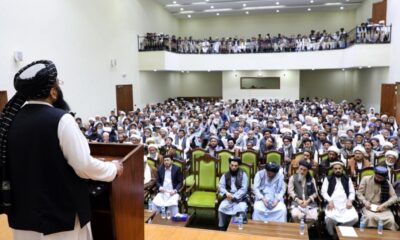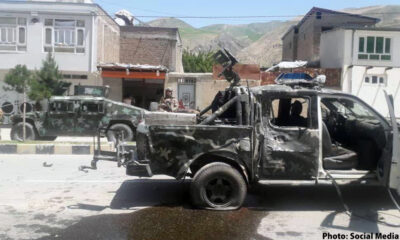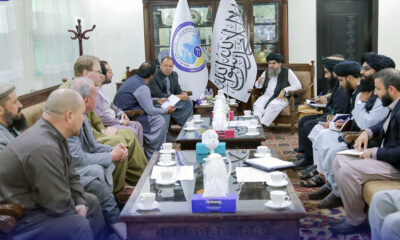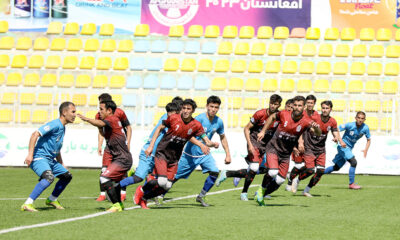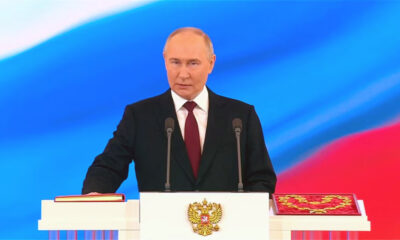World
35 killed in Gaza, 5 in Israel, as violence escalates

Hostilities between Israel and Hamas escalated on Wednesday, with at least 35 killed in Gaza and five in Israel in the most intensive aerial exchanges for years.
Israel carried out hundreds of airstrikes in Gaza into Wednesday morning, as the Islamist group and other Palestinian militants fired multiple rocket barrages at Tel Aviv and Beersheba.
One multi-story residential building in Gaza collapsed and another was heavily damaged after they were repeatedly hit by Israeli air strikes.
Israel said its jets had targeted and killed several Hamas intelligence leaders early on Wednesday. Other strikes targeted what the military said were rocket launch sites, Hamas offices and the homes of Hamas leaders.
It was the heaviest offensive between Israel and Hamas since a 2014 war in Gaza, and prompted international concern that the situation could spiral out of control.
U.N. Middle East peace envoy Tor Wennesland tweeted: “Stop the fire immediately. We’re escalating towards a full scale war. Leaders on all sides have to take the responsibility of de-escalation.
“The cost of war in Gaza is devastating & is being paid by ordinary people. UN is working w/ all sides to restore calm. Stop the violence now,” he wrote.
Gazans homes shook and the sky lit up from Israeli attacks, outgoing rockets and Israeli air defence missiles intercepting them. At least 30 explosions were heard within a matter of minutes just after dawn on Wednesday.
Israelis ran for shelters or flattened themselves on pavements in communities more than 70 km (45 miles) up the coast and into southern Israel amid sounds of explosions as interceptor missiles streaked into the sky.
In the mixed Arab-Jewish town of Lod, near Tel Aviv, two people were killed after a rocket hit a vehicle in the area. Lod and other mixed towns have been gripped by angry demonstrations over the Gaza violence and tensions in Jerusalem.
Hamas’s armed wing said it fired 210 rockets towards Beersheba and Tel Aviv in response to the bombing of the tower buildings in Gaza City. Israel’s military says that around a third of the rockets have fallen short, landing within Gaza.
For Israel, the militants’ targeting of Tel Aviv, its commercial capital, posed a new challenge in the confrontation with the Islamist Hamas group, regarded as a terrorist organisation by Israel and the United States.
The violence followed weeks of tension in Jerusalem during the Muslim fasting month of Ramadan, with clashes between Israeli police and Palestinian protesters in and around Al-Aqsa Mosque, on the compound revered by Jews as Temple Mount and by Muslims as the Noble Sanctuary.
These escalated in recent days ahead of a – now postponed – court hearing in a case that could end with Palestinian families evicted from East Jerusalem homes claimed by Jewish settlers.
Violence has also flared in the occupied West Bank, where a 26-year-old Palestinian was killed by Israeli gunfire during stone-throwing clashes in a refugee camp near the city of Hebron.
‘A VERY HEAVY PRICE’
There appeared no imminent end to the violence. Israeli Prime Minister Benjamin Netanyahu warned that militants would pay a “very heavy” price for the rockets, which reached the outskirts of Jerusalem on Monday during a holiday in Israel commemorating its capture of East Jerusalem in a 1967 war.
The outbreak of hostilities led Netanyahu’s political opponents to suspend negotiations on forming a coalition of right-wing, leftist and centre-left parties to unseat him after an inconclusive March 23 election.
Opposition leader Yair Lapid has three weeks left to establish a government, with a new election – and another chance for Netanyahu to retain power – likely if he fails.
The Arab League, some of whose members have warmed ties with Israel over the last year, accused it of “indiscriminate and irresponsible” attacks in Gaza and said it was responsible for “dangerous escalation” in Jerusalem.
Hamas named its rocket assault “Sword of Jerusalem”, seeking to marginalise Palestinian President Mahmoud Abbas and to present itself as the guardians of Palestinians in Jerusalem.
The militant group’s leader, Ismail Haniyeh, said Israel had “ignited fire in Jerusalem and Al-Aqsa and the flames extended to Gaza, therefore, it is responsible for the consequences.”
Haniyeh said that Qatar, Egypt and the United Nations had been in contact urging calm but that Hamas’s message to Israel was: “If they want to escalate, the resistance is ready, if they want to stop, the resistance is ready.”
The White House said on Tuesday that Israel had a legitimate right to defend itself from rocket attacks but applied pressure on Israel over the treatment of Palestinians, saying Jerusalem must be a place of coexistence.
The United States was delaying U.N. Security Council efforts to issue a public statement on escalating tensions because it could be harmful to behind-the-scenes efforts to end the violence, according to diplomats and a source familiar with the U.S. strategy. State Department spokesman Ned Price urged calm and “restraint on both sides”, saying: “The loss of life, the loss of Israeli life, the loss of Palestinian life, It’s something that we deeply regret.”
He added: “We are urging this message of de-escalation to see this loss of life come to an end.”
PLUMES OF BLACK SMOKE
Israel said it had sent 80 jets to bomb Gaza, and dispatched infantry and armour to reinforce the tanks already gathered on the border, evoking memories of the last Israeli ground incursion into Gaza to stop rocket attacks in 2014.
More than 2,100 Gazans were killed in the seven-week war that followed, according to the Gaza health ministry, along with 73 Israelis, and thousands of homes in Gaza were razed by Israeli forces.
Video footage on Tuesday showed three plumes of thick, black smoke rising from a 13-story Gaza residential and office block as it toppled over after being demolished by Israeli airstrikes.
The Israeli military said the building, in Gaza City’s Rimal neighbourhood, housed “multiple” Hamas offices, including ones for military research and development and military intelligence.
The existence of one Hamas office, used by political leaders and officials dealing with the news media, was widely known locally.
Residents in the block and the surrounding area had been warned to evacuate the area before the airstrike, according to witnesses and the Israeli military.
A second residential and office building in the same neighbourhood was heavily damaged in Israeli attacks shortly before 2 a.m. on Wednesday. Residents and journalists working in the building had already left.
On Tuesday Gaza health ministry officials put the death toll at 32, but a Hamas-affiliated radio station later said three more people, including a woman and a child, were killed shortly before 2 a.m. on Wednesday in an Israeli airstrike on an apartment above a restaurant.
Israeli political leaders and the military said they had killed “dozens” of militants, and hit buildings used by Hamas.
Defence Minister Benny Gantz said Israel had carried out “hundreds” of strikes, and that “buildings will continue to crumble.”
Gaza’s health ministry said that of the people reported dead, 10 were children and one was a woman.
Israel’s Magen David Adom ambulance service said a 50-year-old woman was killed when a rocket hit a building in the Tel Aviv suburb of Rishon Lezion, and that two women had been killed in rocket strikes on Ashkelon.
World
US believes Hamas, Israel can break Gaza ceasefire impasse; Israeli forces cut Rafah aid route
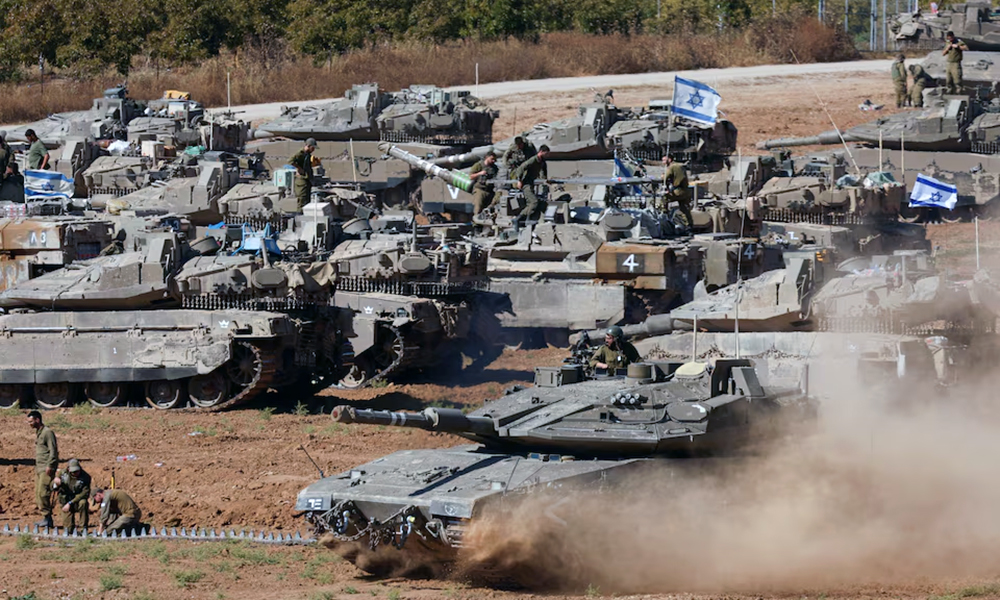
The U.S. said negotiations on a Gaza ceasefire should be able to close the gaps between Israel and Hamas while Israeli forces seized the main border crossing in Rafah on Tuesday, closing a vital route for aid, Reuters reported.
Hamas official Osama Hamdan, speaking to reporters in Beirut, warned that if Israel’s military aggression continued in Rafah, there would be no truce agreement.
The Palestinian militant group accused Israel of undermining ceasefire efforts in the seven-month-long war that has laid waste to Gaza and left hundreds of thousands of its people homeless and hungry.
The truce comments came as Israel invaded Rafah, a southern Gazan city where more than one million displaced Palestinian civilians have sought shelter from Israel’s offensive throughout the tiny territory.
White House spokesperson John Kirby said Hamas offered amendments on Monday to an Israeli proposal aimed at ending the impasse. The deal text, as amended, suggests the remaining gaps can “absolutely be closed,” he said. He declined to specify what those were.
Israel on Monday said a three-phase proposal that Hamas approved was unacceptable.
Kirby said mediators from Qatar and Egypt along with U.S. and Israeli officials were gathering in Cairo. Hamas separately said its delegation was in Cairo as well.
OFFENSIVE
Israel’s seizure of the Rafah crossing came despite weeks of calls that the U.S., other nations and international bodies hoped would deter a big offensive in the Rafah area – which Israel says is Hamas fighters’ last stronghold, read the report.
Israeli army footage showed tanks rolling through the Rafah crossing complex between Gaza and Egypt, and the Israeli flag raised on the Gaza side.
Israeli Prime Minister Benjamin Netanyahu said seizing the crossing was a “very significant step” toward Israel’s stated aim of destroying Hamas’s military capabilities.
Residents reported heavy tank shelling on Tuesday evening in some areas of eastern Rafah. A Rafah municipal building caught fire after Israeli shelling, residents and Hamas media said. Medics said one Palestinian was killed and several wounded in the building while an Israeli strike also killed two Palestinians on a motorcycle.
Health officials said Abu Yousef Al-Najar, the main hospital in Rafah, closed on Tuesday after heavy bombardment nearby led medical staff and around 200 patients to flee, Reuters reported.
“They have gone crazy. Tanks are firing shells and smoke bombs cover the skies,” said Emad Joudat, 55, a Gaza City resident displaced in Rafah.
“I am now seriously thinking of heading north, maybe to the central Gaza area. If they move further into Rafah, it will be the mother of massacres,” he told Reuters via a chat app.
Many of those in Rafah were previously displaced from other parts of Gaza following Israel’s orders to evacuate from there.
Families have been crammed into tented camps and makeshift shelters, suffering from shortages of food, water, medicine and other essentials.
The U.N. and other international aid agencies said the closing of the two crossings into southern Gaza – Rafah and Israeli-controlled Kerem Shalom – had virtually cut the enclave off from outside aid and very few stores were available inside.
Red Crescent sources in Egypt said shipments had completely halted. “These crossings are a lifeline… They need to be reopened without any delay,” Philippe Lazzarini, head of U.N. aid agency UNRWA, said on X.
Separately, Jordan said Israeli settlers attacked a humanitarian convoy on its way to a crossing in northern Gaza.
The White House said it had been told the Kerem Shalom crossing would re-open on Wednesday and fuel deliveries through Rafah would resume then too.
U.N. Secretary-General Antonio Guterres appealed to Israel and Hamas to spare no effort to get a truce deal. “Make no mistake – a full-scale assault on Rafah would be a human catastrophe,” Guterres said.
‘PANIC AND DESPAIR’
Israel’s military said it was conducting a limited operation in Rafah to kill fighters and dismantle infrastructure used by Hamas, which runs Gaza. It told civilians to go to what it calls an “expanded humanitarian zone” some 20 km (12 miles) away.
In Geneva, U.N. humanitarian office spokesperson Jens Laerke said “panic and despair” were gripping the people in Rafah.
Civilians did not have enough time to prepare for evacuation and no safe route to travel, he said. The roads are “littered with unexploded ordnance, massive bombs lying in the street. It’s not safe,” he said.
Critics of the Gaza war have urged U.S. President Joe Biden to pressure Israel to change course. The U.S., Israeli’s closest ally and main weapons supplier, has delayed some arms shipments to Israel for two weeks, according to four sources on Tuesday.
The White House and Pentagon declined comment, but this would be the first such delay since the Biden administration offered its full support to Israel after Hamas’ Oct. 7 attack, read the report.
Israel’s offensive has killed 34,789 Palestinians, most of them civilians, in the conflict, the Gaza Health Ministry said.
The war began when Hamas militants attacked Israel on Oct. 7, killing about 1,200 people and abducting about 250 others, of whom 133 are believed to remain in captivity in Gaza, according to Israeli tallies.
Any truce would be the first pause in fighting since a week-long ceasefire in November during which Hamas freed around half of the hostages and Israel released 240 Palestinians it was holding in its jails.
Since then, all efforts to reach a new truce have foundered over Hamas’ refusal to free more hostages without a promise of a permanent end to the conflict, and Israel’s insistence that it would discuss only a temporary pause.
World
Gaza ceasefire uncertain, Israel vows to continue Rafah operation

Hamas on Monday agreed to a Gaza ceasefire proposal from mediators, but Israel said the terms did not meet its demands and pressed ahead with strikes in Rafah while planning to continue negotiations on a deal.
The developments in the seven-month-old war came as Israeli forces struck Rafah on Gaza’s southern edge from the air and ground and ordered residents to leave parts of the city, which has been a refuge for more than a million displaced Palestinians.
Hamas said in a brief statement that its chief, Ismail Haniyeh, had informed Qatari and Egyptian mediators that the group accepted their proposal for a ceasefire.
Israeli Prime Minister Benjamin Netanyahu’s office said later that the truce proposal fell short of Israel’s demands but Israel would send a delegation to meet with negotiators to try to reach an agreement.
Qatar’s foreign ministry said its delegation will head to Cairo on Tuesday to resume indirect negotiations between Israel and Hamas.
In a statement, Netanyahu’s office added that his war cabinet approved continuing an operation in Rafah. Jordan’s Foreign Minister Ayman Safadi said on social media site X that Netanyahu was jeopardizing a ceasefire by bombing Rafah.
An Israeli official, speaking on condition of anonymity, said the proposal that Hamas approved was a watered-down version of an Egyptian offer and included elements that Israel could not accept.
“This would appear to be a ruse intended to make Israel look like the side refusing a deal,” said the Israeli official.
U.S. State Department spokesman Matthew Miller said Washington would discuss the Hamas response with its allies in the coming hours, and a deal was “absolutely achievable”.
More than 34,600 Palestinians have been killed in the conflict, according to Gaza health officials. The U.N. has said famine is imminent in the enclave.
The war began when Hamas attacked Israel on Oct. 7, killing about 1,200 people and abducting 252 others, of whom 133 are believed to remain in captivity in Gaza, according to Israeli tallies.
RAFAH HIT BY STRIKES
Any truce would be the first pause in fighting since a week-long ceasefire in November, during which Hamas freed around half of the hostages.
Since then, all efforts to reach a new truce have foundered over Hamas’ refusal to free more hostages without a promise of a permanent end to the conflict, and Israel’s insistence that it would discuss only a temporary pause.
Taher Al-Nono, a Hamas official and adviser to Haniyeh, told Reuters the proposal met the group’s demands for reconstruction efforts in Gaza, return of displaced Palestinians and a swap of Israeli hostages for Palestinian prisoners in Israeli jails.
The Hamas deputy chief in Gaza, Khalil Al-Hayya, told Al Jazeera television the proposal comprised three phases of six weeks each, with Israel to pull its troops out of Gaza in the second phase.
Earlier on Monday, Israel ordered the evacuation of parts of Rafah, the city on the Egyptian border that has served as the last sanctuary for around half of Gaza’s 2.3 million residents.
An Israeli strike on a house in Rafah killed five Palestinians, including a woman and a girl, medics said.
Israel believes that a significant number of Hamas fighters, along with potentially dozens of hostages, are in Rafah and has said that victory requires taking the key city.
Israel’s closest ally, the United States, has called on it not to assault Rafah, saying it must not do so without a full plan in place to protect civilians there, which has yet to be presented.
A separate U.S. official said that Washington is concerned about Israel’s latest strikes against Rafah but does not believe they represent a major military operation.
Israel said on Monday it was conducting limited operations on the eastern part of Rafah. Palestinian residents said there were massive air strikes.
“They have been firing since last night and today after the evacuation orders, the bombardment became more intense because they want to frighten us to leave,” Jaber Abu Nazly, a 40-year-old father of two, told Reuters via a chat app.
“Others are wondering whether there is any place safe in the whole of Gaza,” he added.
Instructed by Arabic text messages, phone calls and flyers to move to what the Israeli military called an “expanded humanitarian zone” around 20 km (12 miles) away, some Palestinian families began trundling away in chilly spring rain.
Some piled children and possessions onto donkey carts, while others left by pick-up or on foot through muddy streets.
As families dismantled tents and folded belongings, Abdullah Al-Najar said this was the fourth time he had been displaced since the fighting began seven months ago.
“God knows where we will go now. We have not decided yet.”
(Reuters)
World
Hamas says it accepts ceasefire proposal of Egypt, Qatar
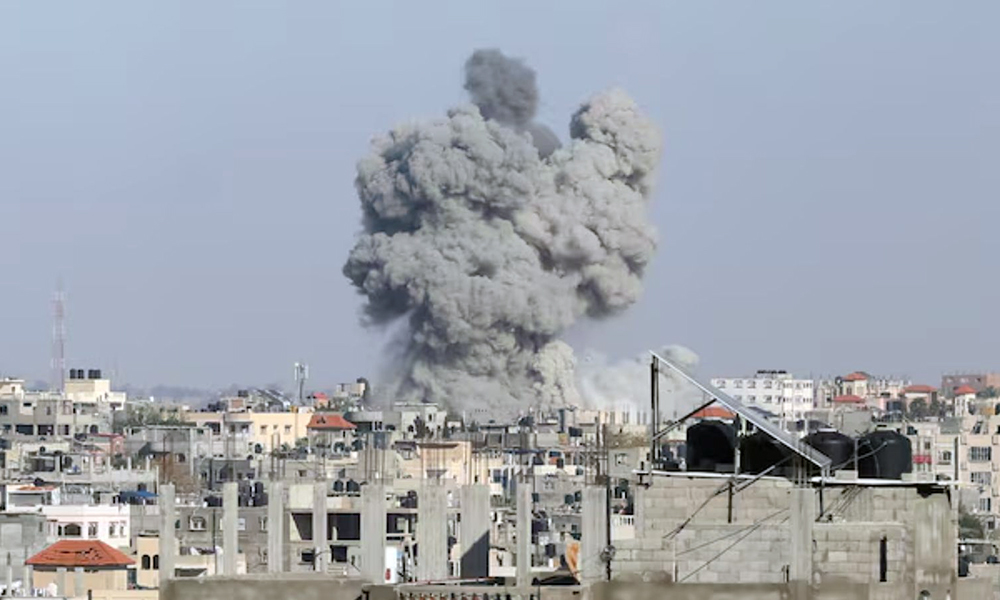
Hamas said on Monday that it had accepted a Gaza ceasefire proposal from Egypt and Qatar, Reuters reported.
The Islamist faction said in a statement that its chief, Ismail Haniyeh, had informed Qatar’s prime minister and Egypt’s intelligence chief of its acceptance of their proposal.
There were no immediate details over what the agreement entailed.
-

 Sport4 days ago
Sport4 days agoDu Plessis, Kohli help Bengaluru stay in IPL play-off race
-

 Latest News5 days ago
Latest News5 days agoTrans-Afghan railway project expected to be completed by end of 2027: Uzbek official
-
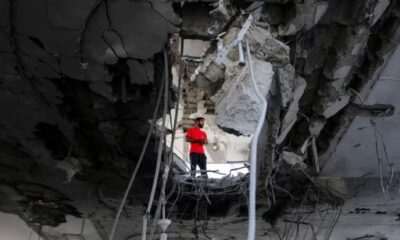
 World5 days ago
World5 days agoHamas, CIA director to hold talks in Cairo on Gaza truce
-

 Sport4 days ago
Sport4 days agoSarsabz Yashlar and Sorkh Poshan win Saturday’s ACL matches
-
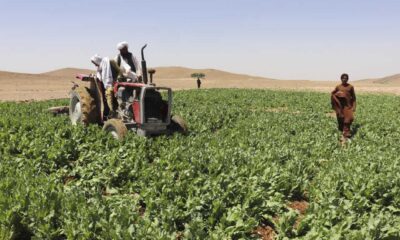
 Latest News4 days ago
Latest News4 days agoBan on opium cultivation in Afghanistan cost farmers $1.3 billion
-
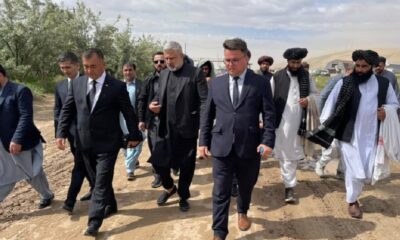
 Business3 days ago
Business3 days agoTurkmenistan business delegation visits Herat
-
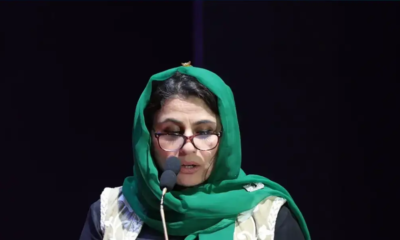
 Latest News5 days ago
Latest News5 days agoAfghan consul general in Mumbai Zakia Wardak resigns
-
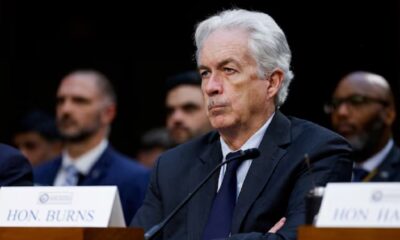
 World4 days ago
World4 days agoHamas negotiators in Cairo for Gaza truce talks


